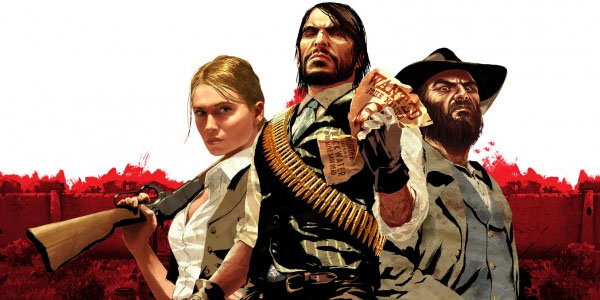
There are many kinds of love.
There’s romantic love, platonic love, paternal affection, obsessive bemusement - the fact of the matter is a simple four letter word like "love" can have endlessly complex meanings that are made all-the-more complex when you add the words “female” and “character” to the mix.
When it comes to gaming, female characters generally get a bad rap - they’re either written off, maligned, used as set dressing, have the personality of a picket fence, or are sexually fetishized to the point of caricature - mostly because of the institutional notion that gaming is for boys only.
Developers often focus on making characters boys will find appealing versus characters everyone will find endearing. It’s the difference between a 2014 Mustang GT and The Meth Cooking Van from Breaking Bad. The Mustang is cooler, sexier, more powerful, and you get a bit tight in the jeans when you hear the engine roar. But bang-for-buck, the Meth Van is the more endearing and ‘love’able car. It has personality. It’s unique. There are no other Breaking Bad Meth Vans, there are thousands of Mustangs. In much the same way, the characters we fall in love with don’t win us over with their polygonal d-cups or bump-mapped booties. We want strong characters.
Strong can mean many things. You can have a physically strong character without much depth or mental dexterity - like Faora in Man of Steel, a mentally resolute character without much physical strength like Jodie Foster in Contact, or a wonderfully complex character that is neither physically strong or intrinsically smart, but has many layers and nuances that make them compelling, like Sharon Stone’s character in Casino. You can have one that's all three - like Sarah Connor in Terminator 2.
Strong characters win us over with personality and complexity - and sure, nice legs can help, but the best characters in film, television, and gaming are more Meth Van than Mustang. They’re flawed, they’re sticky, they’re complicated - they rattle around in your head for awhile and you’re not quite sure why.
Thus, presented for your (dis)approval are 10 such sticky, complicated, rattling-around-in-your-head women you can’t help but love.

10) Naomi Hunter - Metal Gear Solid
Before Metal Gear Solid jumped aboard the full-steam-ahead crazy train with its sequels, it told a somewhat grounded in reality sci-fi / espionage tale. Along for that ride was an iconic cast including Solid Snake, Liquid Snake, Revolver Ocelot, Otacon, General Campbell, and a scientist with questionable motives - Naomi Hunter.As the woman directly responsible for setting the conspiratorial elements of Metal Gear Solid in motion by injecting Snake with FoxDie, then ultimately regretting her actions, Naomi became a fascinatingly complex character. She turns from radio contact , to antagonist, to confidant, to proverbial cheerleader and world philosopher by the time the game ends.
Though the trope of the ‘vixen with secrets and questionable motives’ is nothing new, Naomi was the first time we saw it executed so flawlessly in an interactive media space. All her lines are fully voiced, she’s integral to many happenings in the plot, and quite a few of her personal revelations make her ‘evil’ actions sympathetic, which makes her a character you felt for emotionally.
Yes, sure it totally helps Naomi is smokin’ hot, but the ‘beauty’ of her character comes from how she’s just as battle scarred as everyone else in the game. She may not have ‘real’ blood on her hands like Snake or Ocelot or Campbell, but war has taken just as much from her as it has them. Possibly more - she never got a chance to fire back.
Her story is tragic, and her actions are understandable, which rarely happens in gaming, and happens rarer still with female characters in gaming. She was a dynamic character in one of the most dynamic games of all time and arguably the linchpin for the entire franchise. Players fell in love with Naomi because we felt for Naomi in ways that were complicated. We loved her, we hated her, regardless, we couldn’t stop thinking about her.
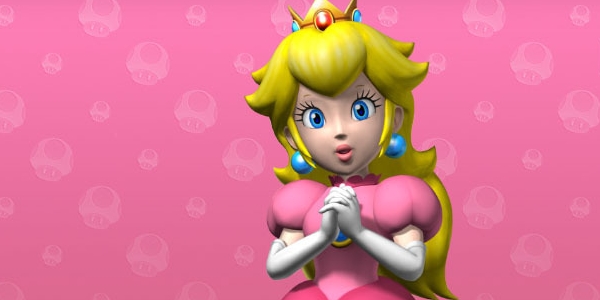
9) Princess Toadstool - Super Mario Bros. 2
This is hopefully the only situation where a female character makes it onto the list based on objectification alone. Face it Princess, we like ya for your floating hooptee. In Super Mario Bros 2, The Princess had the ability to levitate, thus making Mario Bros 2’s platforming roughly 64 percent easier for most players.While there is little depth to Princess Toadstool character wise, Mario 2 was one of the first games that took our traditional idea of what a lady would be - in this case a princess with a billowing dress, and made it surprising and out-of-the-box.
While Samus was gaming’s first Femme Fatale, we never knew she was a she until the ending of the game. In Mario 2, gamers knew they were selecting a foofy-tooty, pinky-raised, lady girl, and did it over and over and over again because she had something to offer the other characters simply didn’t.
If that's not progress, I don't know what is.
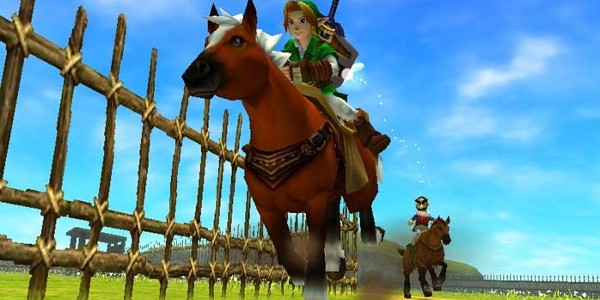
8) Epona - The Legend of Zelda: OOT.
Riding Epona for the first time is an incredible experience. Yes, Epona is a horse, but doesn't everyone love their pets? She also represents the incredible amount of freedom the N64 could provide when it came to rendering outdoor environments - her very presence suggesting the game is so huge you'll need an extra form of transportation just to see it all.From the majesty of her arrival to the way the music soars and hoofs hit the ground when seeing just how fast you can push her, there are very few experiences that truly capture the essence of a human's relationship with a beloved animal - Riding Epona made you want to ride a real horse.
She's a comfort after a retreat, a friend to celebrate a victory with, and a wonderful partner in crime when you first break her out of the ranch. In "Majora's Mask" you find yourself clinging to her as your last connection to lucidity, and it's an incredibly powerful image.
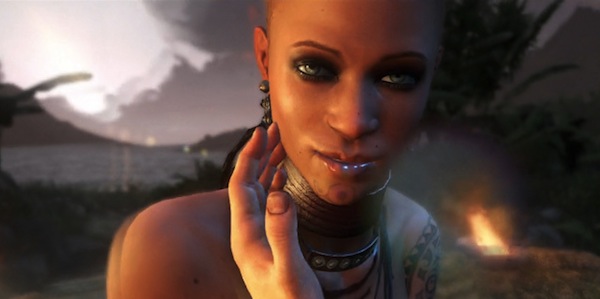
7) Citra - Far Cry 3
The lack of thrill in our day-to-day lives leads us to drugs, to booze, to skydiving, to auto-erotic asphyxiation and many other external release valves for those that live quiet lives of domestic desperation. We no longer hunt. We no longer build. We no longer brawl and tumble and assert our dominance by the will of our physical strength. These frustrations often manifest themselves in one way.The Other Woman.
Men continuously cheat on their wives and girlfriends simply because they can. The temptation of something new and different and viscerally exciting is almost always too strong to ignore - it taps into something just to the right of the soul.
Far Cry 3's Citra is the idea of "The Other Woman" turned up to 11. She is everything your current life and current girlfriend is not. Exotic. Smart. Sexy. Dangerous. Powerful. She literally and figuratively seduces your character, pulling long dormant instincts out of game protagonist Jason Brody; a soft-handed suburban party boy. Jason has it all but feels empty. Citra gives him purpose.
The player can't help but be infatuated by her methods - she's brilliant in every way. She finds Brody has a particular talent for the way of the warrior. As he grows more cunning and bestial, he starts to disconnect with the friends he's been rescuing the whole game because they don't understand the new him. Only Citra does.
As the game marches to its unfortunate conclusion, it becomes apparent Citra isn't all she seems. But by then it's almost too late - you can't go back to where you were, and going with Citra means something you're not quite ready to accept - you're devoted too, and even love, Citra.

6) Tifa - Final Fantasy VII
If you close your eyes and think of the one person most responsible for your well-being, it's very rarely the same person you think of as your life's great love. While the romantic interest of Final Fantasy VII is Aeris, whose death made pubescent boys across the world cry (or claim to cry), the game’s soul lay in Tifa and Cloud’s relationship. That relationship climaxes when Cloud’s entire world is shattered, and Tifa brings Cloud back from the brink of mental extinction through sheer force of will.A life-long friend to Cloud, the events of Final Fantasy VII reveal a great deal of their history with each other, including childhood dreams, their incredibly complicated feelings for each other and more than a few (very real) battle scars between the two. Tifa is compassionate, assertive, politically active (having her own eco-terrorism group), and a small business owner to boot. But beyond that, she's not afraid to challenge authority, tell it like it is, and stand up to the 'boys'.
Aeris is the character we cherish, but Tifa should be the character we should love - she's been there all along. She's Ducky from Pretty in Pink, happy to stand by your side, long-suffering, until eventually she's all you have left. In fact, if you make a couple proper in-game choices, the famous Golden Saucer date sequence happens between Cloud and Tifa instead of Cloud and Aeris.
Tifa didn't tug at your heartstrings the same way Aeris did. No, instead, she mended them back together, and in a world where more love is lost than found, that's the kind of loving friendship you can't help but appreciate.

5) Elizabeth - Bioshock: Infinite
For being such a visually impressive game, Bioshock: Infinite does a lot of talking. Expository dialogue is frequent, and often times it feels like the game would be better as a thoughtful Tell-tale style adventure game instead of a graphically violent first person shooter.However, the character of Elizabeth is instantly iconic. From the big, wide, Disney princess eyes, to her compassion for the NPCs do you *don’t* shamelessly murder, it’s easy to like Elizabeth. But we wouldn’t love her if it weren’t for a single scene.
Involving dancing.
After you break Elizabeth out of her library / prison, you eventually come across a beautiful, Cony Island-like, beach. The second you take your eyes off her, she wanders off to a group of people and the next thing you know she’s dancing with a most wonderful expression on her face. She is free, and wants you to join in. If you don’t press the button input or interact with her, she’ll be swaying her arms, kicking her feet, and twirling in circles for eternity - endlessly happy.
Unfortunately the reality of the situation is you need to take Elizabeth out of that joyful state and continue on with the mission - in effect snatching back her long-sought freedom you gave her moments ago.
Which makes you feel like the biggest jack-ass ever, especially since you’re lying to Elizabeth about your reason for rescuing her in the first place. The guilt complies and complies as you move through the game and your character does many things out of your control - some to the benefit, some to the detriment, of Elizabeth, all the while hoping for the moment either Booker DeWitt, the game’s protagonist, comes clean and truly tries to help Elizabeth, or Elizabeth realizes what’s going on and sets out on her own.
I won’t spoil what happens or how, but rest assured the twists and turns in their fate are many and most are memorable. But Bioshock never reaches the heights of that one scene on the beach where metaphorical Rapunzel lets down her proverbial hair for what seems like the first and only time in her life - and you can’t help but love her for it.
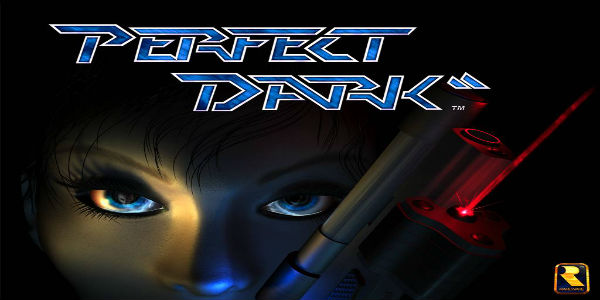
Keep Hogwarts, J.K Rowling. Stow those Pistols, Laura. We’ll be spending our nights with a spy so cold she’s a popsicle with a license to kill. A bombshell so bodacious you needed an expansion pack just handle her very presence. A dame so smokin’ her clothes appear melted onto her body.
Enter Joanna Dark, protagonist of Perfect Dark, the long-awaited followup to the classic N64 game Golden Eye. Lara Croft may be the queen bee when it comes to British lady dames of adventure, but Joanna always felt like the more maturely constructed character. Because Perfect Dark was a first person shooter, gamers never got around to fetishizing Joanna in the way Lara Croft was. Joanna’s boobs didn’t stick out three feet in front of her face, she wasn’t clad in a bathrobe as a bonus during a secret mission, and she kicked so.much.ass.
In much the same way James Bond is more an aura than a specific person, we fell in love with Joanna Dark the way we fell in love with Mary Poppins or Mrs. Doubtfire or Mother Superior from Sister Act. She inhabits a the very specific archetype of that stern, whip-smart, oddly polite, British authority figure that tells it like it is and has been winning over audiences for decades.
Now give that archetype then an arsenal the size of Ireland. awww yeahhh. Playing as Joanna, rampaging through Datadyne HQ in the game’s opening missions and reveling in the shocked gasps and sexist quips of bad guys you’re about to stone cold kill is the apex of what turn-of-the-century console gaming had to offer.
For a first person game that came out wayyyy back in 2000, you get a good sense of what she’s all about - namely kicking ass and shooting bad guys. Playing as Joanna felt smooth. Interacting with NPCs was interesting and memorable because we hadn’t seen that level of idle chatter in an n64 game before. That Joanna conveyed such personality and was fully voiced throughout the game’s cutscenes and radio conversations was a small miracle.
That Joanna existed at all was a bigger one. Making the main character of a violent first person shooter aimed at ‘boy’ gamers a lady was a substantial risk that was thankfully never mitigated by grotesquely playing up Joanna’s sexuality the title, and in essence Joanna, was sold on solid gameplay and a character gamers could get behind and root for.
And we did, and do.

3) Bonnie MacFarlane - Red Dead Redemption
The best way to describe Bonnie MacFarlane from Red Dead Redemption would be for her to punch you in the face. Then, after, you'd chew some tobacco, aim for the closest spittoon, and slur out "Now that’s a woman!" while rubbing your new-found shiner.Bonnie makes an immediate impact on the world of Red Dead Redemption, setting the tone for the 'old west' open world game, atmospherically, narratively, and mechanically. Kimberly Irion brings immense gravitas to the role, voicing a strong-willed, tough-as-nails rancher that watches her own hide, but may look after the hide of someone else if they seem like a decent enough person. In a very short amount of time the player learns about her, her family, and the people that count on her in a way that also introduces the player to the game world.
Because we want to get to know this character, the early tutorial missions that can typically be a slog in most open world games become a window in the life and times of a typical person in the old west, though Bonnie is anything but typical.
It's worth noting that John and Bonnie's relationship is platonic. There's a definitive connection between their personalities,but is a married man, in a rare show of restraint from Rockstar Games, he refuses to sleep with anyone the entirety of the game - despite perhaps a subtle advance from Bonnie.
Still, it's cool that two characters in a hyper-violent videogame can bond over something other than copulation. They get along swimmingly, and have strong values, and even better, Bonnie is a mentor to the player, and a colleague to John, creating an interesting dynamic where the character means one thing to the player, and another thing to the character the player inhabits.

2) Clementine - The Walking Dead
It takes balls to make the most important character of a zombie game an 8 year old girl named Clementine. While the main character is Lee, a typically assertive protagonist with a dark past, everything Lee does is reflected in the changing life and worldview of Clem - who is anything but a typical kid you’d find in a video game.Clementine is easy to like and easy to care about. She feels like a real person first, kid second; you see her treehouse and rope swing in episode one, and she does kid-like things throughout the game. But in conversing with Clem there’s a uniqueness to her personality and an undercurrent of childlike optimism from her. She’ll pipe in with a line of dialog or question that catches you off guard because it’s something only a kid like Clem would say. She feels authentic.
Clem is also constantly watching Lee. Throughout The Walking Dead, you make tough choices done in the name of survival that have many morally gray aspects and can repugnant in the eyes of a child. When Clem asks you about these adult problems like zombies, or arguments, or a guy you murdered - figuring out how to convey the tough choices to her without sounding like a sociopathic monster, or scaring her, is tricky - often because she’ll hit you with a simple kid-like truth about your actions if they were abhorrent.
Thus you play The Walking Dead with Clem’s conscious hanging over your every move. If you really think about it, almost every choice in the game has you wondering what Clem will think of you afterwards. You know that cliche when someone says “I couldn’t look at my kids again if I did that”? Well this game has you do that thing you couldn’t do - and makes you feel absolutely awful for it, specifically because Clem is a character you want to do right by because she’s a good kid, versus one you should do right by to get the best ending or highest score.
At one point in The Walking Dead’s 3rd episode Lee goes from being Clem’s protector to being her de facto parent - cutting her hair and showing her how to survive in a world that has gone so very wrong, doling out hard-to-hear truths he may have been hiding. The message is clear: Lee might not always be there to help and Clementine must know how to survive on her own - even if it comes at the expense of the innocence that made us like her in the first place.
The Walking Dead reveals its soul during this sequence - taking what should be a scary zombie game and turning into a bittersweet fable about parenting, made all the more poignant by the game’s far-reaching system of choices with murky long-term consequences that speak to the paradox of parenting, namely how to balance the compulsion to nurture and protect someone you care for while preparing for them independence. And because Clem is such a likable character, these scenes really do pull at the heart. In a weird, strange, video-gamey way you’re raising a child and your ‘parental’ choices will weigh on you every time she acts on her own.
By the end of The Walking Dead you have a ferocious loyalty to Clem and the people you brought with you through the game’s five episodes - only for developers Telltale Games to rip your heart right out in a completely unexpected way where suddenly the only thing that matters in the entire world is Clem - and it is in those moments, where every ‘parenting choice’ you made begins to come to fruition, you’ve never felt more connected to a character, and more responsible for their ultimate success or failure in the ‘real’ world. Bring tissues.

1) Tonya - Grand Theft Auto V
Sometimes people break bad. Not in the cool meth empire way, but in the sad smoke too much crack and constantly make excuses for their lives and say things will get better tomorrow way. These people pop up in our lives over and over again, a little better, a little worse, but you know that regardless of what’s happening to them, you can’t help them unless they’re willing to help themselves. In Grand Theft Auto V that character is Tonya, a lifelong friend and former romantic acquaintance of Franklin, one of Grand Theft Auto V’s main characters.Tonya is addicted to crack.
She breaks your heart. She goes on about the good ole days, makes excuses for her boyfriend that she supports because he provides a roof and a place to go, all the while trying to see if Franklin would sleep with her since she views him as a far more successful person. She’s a tortured soul looking outward for an inward kind of problem.
You end up meeting Tonya while doing tow truck missions Tonya’s boyfriend couldn’t do. She comes with you, talks your ear off, makes excuses for her situation, has mood swings, tries to insert herself into your life, and she’s a character that hits close to home for far too many players - everyone has that one friend you can’t think about with an elongated sigh and a shrug at what could have possibly went wrong.
But there’s a glimmer of something within Tonya that pulls you in. A hint of a personality that’s likable and endearing, which makes her current situation all-the-more paining. The problem with addicts is that they’re people you know and care about - and it’s often impossible to wrench them from the jaws of that cycle no matter how hard you try or how miserable they seem. You can even love the person, but what the substances do to that person forces you to disconnect before the pain becomes too great.
When people talk about well-rounded characters in games, people you care about - Tonya here is the brass ring. She may be weak, but her character is strong and complex. She does bad things, but is not a bad person. She has a multitude of flaws, but means well. She has a history, but isn't an expository device. It’s so difficult to cast judgement on her as just a drug addict, or just a hanger-on, or just a “ho” that you keep swinging by that tow truck again to see what she’ll say next, and hope maybe she’ll figure herself out.
She doesn’t.
Sometimes love ends poorly. Sometimes you meet and connect and care about someone despite their insanities, addictions, prejudices and failings because you see the glow of a soul somewhere deep down you need to pull out of the dark and let shine - and when you can’t you quite reach, need to get out before the darkness takes your soul, too.
Thus remembering Tonya is frustrating. For those that paid attention to her and cared, the resolution was nebulous and we never do find out what happened to her - which ironically feels just about right considering her situation, and still stings just a bit as it should.
In fact, as all love should.
Follow @MeekinOnMovies
No comments:
Post a Comment